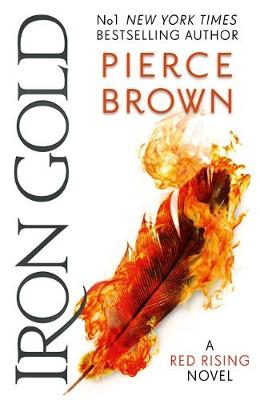Reviewed by ross91 on
I think the real strenght of this book laid in how well most of the secondary characters where depicted: Romulus, Dido, Volga, Dancer, Alexandar, Diomedes, Cassius, Rhonna, Apollonius, the Duke... they were all unique, realistic and amazing in their own ways.
Another thing I utterly appreciated was all the research Brown's did to base his society on Roman and Greek history. I'm Italian and studying ancient history and myths about the roman empire and greek first democracy and other stuff like that is basically what I did throughout all my studying years so I'm happy to see that the heritage this society claims is well thought and well regarded. Ancient names and myths and latin phrases are not mere easter eggs for history junkies, but I feel they all had a purpose.
I especially appreciated the "pulvis et umbra sumus" ("we are but dust and shadow"), which is my all-time favorite latin quote and it's a line from a well known Oratio's Ode. It brought me back to my high school years and it made me want to reread some of those latin poems (even though my knowledge of latin is not the one it used to be).
Another thing I found particularly well done was the world building, and with this I don't mean just how the cities were described, but also the feel the places had, the shades of the society and the traditions and the history we encounter. I think a fictional world could be described as believable only when all its parts make sense, from the basic outlines to the very last detail. I find the Rim a perfect example of that: the environment those people lived in created a philosophy, a lifestyle, specific traditions and rules and mindsets. It was all cohesive and it all made perfect sense.
That was by far the best part of the book and also the main reason why I was particularly excited whenever there was a Lysander's chapter.
I also tend to like books with heavy politics more than the action packed ones (that's the main reason why The Well of Ascension is my favorite Mistborn book and also why I loved Golden Son that much), so I wasn't bothered at all about all the scheming, the power struggles, the votes counting and the trials. I actually enjoyed them a lot.
So, why not 5 stars?
Well, the main reason is that I struggled -for different reasons - with all the four POVs.
I loved Lysander's chapters mainly for their setting and the cast of very interesting people, but I didn't understand most of this boy's actions and couldn't relate with his concept of morality and the reasons why he acted a certain way throughout the book.
I also really enjoyed Darrow's POV, because they were the most eventful and in them there were the people I care for the most. I also resented him A LOT. He basically turned out to be a moron, a pityful martyr, a villain and a dictator all at once. I dind't mind that a lot actually, I'm always game for fallen heroes and hopeful redemption arcs, I also understood his reasons most of the times (even if they were wrong), but sometimes he was just frustrating and the end didn't make any sense to me.
Lyria I didn't like very much, I was kinda bored with her storyline and I though she didn't add anything relevant to the plot (even later), but at least she offered the reader a window for the political games on Luna, even though we could have had a different POV (I would have paid to have Quicksilver's or Victra's or Dancer's or even Sefi's). I understand that Brown's intentions were to bring different kind of people with different grades of influence in the story, but I, as a reader, want to be at the center, where the plot unfolds and people have the power to sway the events one way or the other. I feel like Lyria was very marginal at first and by the end she kind of evolved as a person, but still didn't bring anything relevant to the story. She was a subject of the events and a subject she remained up until the very end. What a pity.
And then there was Ephraim who I hated and was really unnecessary. I wish all his chapters were cut out of the story, so this way we would have had more plot development and at 40% I would not have felt as if the story had yet to begin.
Anyway, this is a solid 4 stars. It's the start of a new series (yes, I still think Morning Star was the ending of Red Rising, this one I call a second era) and so it feels like we are in for an adventure (and a tragedy i feel) that is only just begun.
Reading updates
- Started reading
- 18 February, 2018: Finished reading
- 18 February, 2018: Reviewed
- Started reading
- Finished reading
- 18 February, 2018: Reviewed
